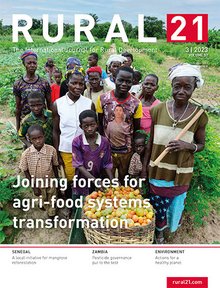Vol. 57 No. 3/2023
Joining forces for agri-food systems transformation
Our current agricultural and food systems are not capable of providing the global population with sufficient and healthy food within the planetary boundaries. Worse still, with their high freshwater consumption, their greenhouse gas emissions and their representing a threat to biodiversity, they destroy their very own ecological basis. The multiple crises of the last few years have added to all this, with the consequence that Sustainable Development Goal 2 – ending hunger by 2030 – will definitely not be reached.
It is generally agreed that our agricultural and food systems need fundamental changes – towards sustainability, resilience, health, equity and inclusiveness. But how can this best be achieved? Based on the global discourses of the past years and the initiatives emerging from them, our authors have identified key levers and cornerstones for successful agri-food systems transformation.
As can be expected, these vary depending on whether they reflect the view of politics, science or civil society. Nevertheless, consensus has been reached on many issues. The transformation pathways have to be systemic and cross-sectoral, and must break down complexity. They have to be locally owned, context-specific and include all stakeholder groups. They must regard trade-offs as inherent and create an acceptable compensation for the losers. And they have to contain short-, medium- and long-term activities. Based on experience gained in Ethiopia, Kenya, Rwanda and Tanzania, in Chile and Brazil, and in Bangladesh and Vietnam, our authors show what this can look like in practice.
Click here if you are interested to subscribe
Download edition 2023/03 Focus: "Joining forces for agri-food systems transformation
Focus
- Transforming agricultural and food systems – why and how
- Policy coherence and food systems transformation
- Supporting governments in optimising agricultural spending and policies – FAO’s MAFAP programme
- Gender justice – a precondition for resilience
- People-centred collaboration – four key principles for equity and sustainability in the food systems transformation
- “A system that is uniform is not resilient”
- From vision to action – towards resilient food systems in Ethiopia’s highlands
- The socio-economic effects of the commercialisation of African indigenous vegetables
- Leveraging the potential of secondary cities
- How effective are policy interventions in food environments?
- Food systems transformation in Vietnam – research and collaboration lay the foundation
- Welthungerhilfe’s food system framework – a compass for practitioners
- Igniting a spark for landscape restoration




